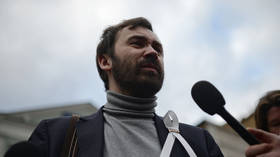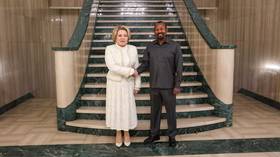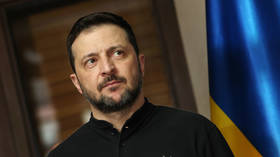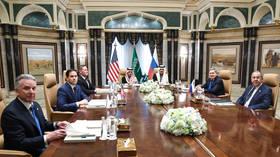Georgia on their minds: West tries to make a Serbia out of Russia
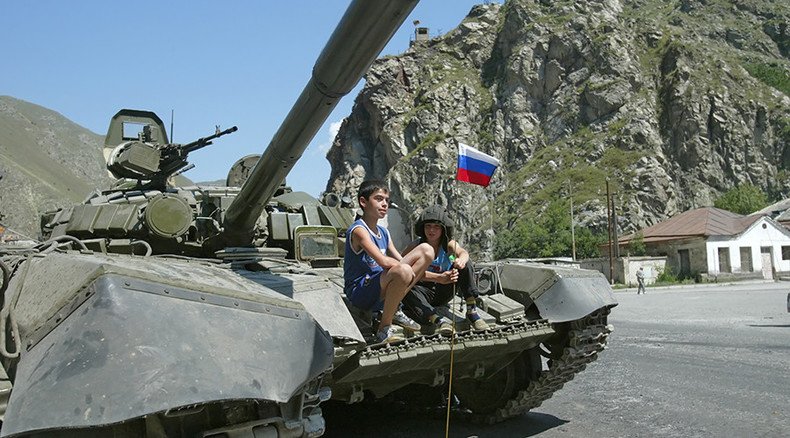
Putin calls the West’s bluff on fighting ISIS in Syria. Western elite figures are most unhappy. The Empire badly needs to strike a blow at Russia – and right on cue, the issue of ‘war crimes’ in Georgia miraculously comes to the fore!
This Thursday it was announced that the International Criminal Court was planning to investigate possible crimes committed during the conflict between Georgia and Russia in 2008.
Reuters reports: ‘the court said that Prosecutor Fatou Bensouda had concluded there was a “reasonable basis to believe” crimes had been committed during the short war over the Russian-backed breakaway Georgian province of South Ossetia.”
“A favorable decision by the judges would pit non-ICC member Russia versus the European-backed global war crimes court at a time of high East-West tensions over the conflicts in Ukraine and Syria,” says Radio Free Europe/Radio Liberty.
Now, it could be that the timing of this is a total coincidence. That it just so happened that over seven years after the events in question, the ICC decided to make a statement on Georgia, in the same week that the Western elites were fuming over Russia out-maneuvering them in Syria and leaving their ‘regime change’ plans for Damascus in tatters.
ICC considers investigation into possible war crimes committed during South Ossetia war http://t.co/IuUpZxhPBLpic.twitter.com/owX3GJDqSU
— RT (@RT_com) October 9, 2015And it could also be a coincidence that NATO too has been talking about Georgia rather loudly this week.
“Georgia is a sovereign nation with internationally recognized borders. It has the right to determine its own future. And its own security arrangements. Yet today, Russia still violates Georgia’s borders. NATO calls on Russia to reverse its recognition of the South Ossetia and Abkhazia regions of Georgia as independent states. Georgia is one of NATO’s closest partners. We are committed to deepening our partnership,” declared NATO Secretary General Jens Stoltenberg.
Isn’t it interesting how the issue of Georgia, the independence of South Ossetia and Abkhazia and war crimes committed in the conflict, has become a ‘hot topic’ in this of all weeks? What was a dead issue has suddenly come alive. Now it’s not just Hoagy Carmichael, but quite a few other people that have Georgia on their minds.
It’s very hard to escape the conclusion that NATO and the West are desperate to use all possible instruments against Russia to ‘punish’ them for having the temerity to drop bombs in Syria – something only NATO powers and its allies believe they have the right to do. If so, it wouldn‘t be anything new.
Seeking to ‘punish’ countries by bringing up events of the past and threatening them with war crimes investigations is something the US and its closest allies have done plenty of times in the past.
With Serbia, politically-motivated war crimes indictments were used to bully the country into toeing the Washington line and taking a pro-Western ‘reform’ path which benefited Western capital.
‘Woman spent days near dead son’s body waiting for help’: RT recalls 2008 war in S.Ossetia http://t.co/8oGrYAZ764pic.twitter.com/4hLnQT5KqI
— RT (@RT_com) August 8, 2015Think back to the illegal NATO bombing of Yugoslavia in 1999. Washington’s chief hawk, Secretary of State Madeline Albright, thought the Yugoslav government would capitulate in a matter of days. “I don’t see this is a long term operation. I think this is something that is achievable within a relatively short space of time,” she boasted.
But the Yugoslav government did not capitulate and NATO’s campaign started to run into difficulties. The ‘humanitarian’ bombers of the West hit a number of civilian targets including Serbian television, a passenger train, and a convoy of Kosovan Albanians, which they shamefully tried to blame on Yugoslav forces. As the civilian casualties mounted, splits started to grow between NATO member states. The US was rattled. Something needed to be done to increase pressure on Belgrade and isolate the Yugoslavia leadership further.
Right on cue, on the 27th of May, Yugoslav President Slobodan Milosevic and four other leading political and military figures in the country (including the Chief of Staff of the Yugoslav Army) were indicted for war crimes by the ICTY.
The timing could not have been better for Washington. We know that the US and Britain were informed of the decision by ICTY Prosecutor Louise Arbour two days before it was publicly announced – with Arbour discussing it in a ten minute telephone call with US President Bill Clinton and British Prime Minister Tony Blair.
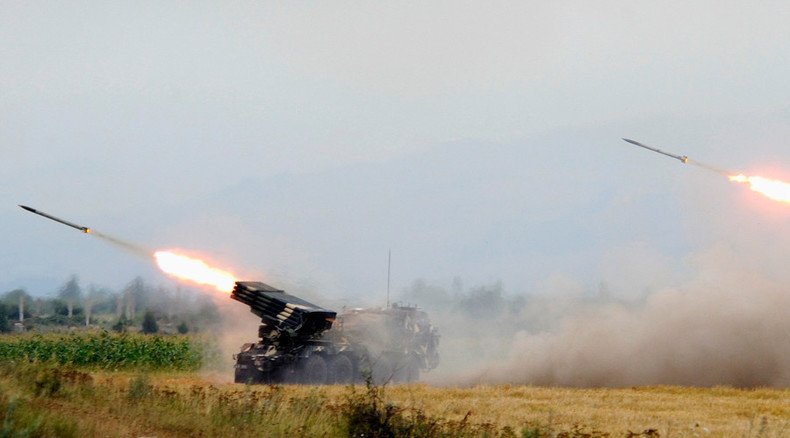
An ‘independent’ court? The ICTY was anything but.
Fast forward to May 2011. NATO was once again bombing a sovereign state – this time Libya. Again, things weren’t going quite according to plan as NATO hadn’t made the advances they thought they would have by this stage. The government of Muammar Gaddafi called for a truce and for peace negotiations with the anti-government Western-backed ‘rebels’ based in Benghazi. But a truce and a negotiated settlement was the last thing NATO wanted – they were hell-bent on regime change and turning one of the richest countries in Africa into a failed state.
One day later, it was announced that the ICC’s chief prosecutor was officially seeking an arrest warrant for Gaddafi (and his son Saif al-Islam and Intelligence chief Abdullah Senussi) for ‘crimes against humanity‘ – sabotaging any hopes for a peaceful resolution.
READ MORE: Between Georgia and South Ossetia, war-torn families, villages and vineyards
Now of course, the indictments of Milosevic and Gaddafi at times when wars against their countries were not going well for NATO could again have just been one big coincidence. But there was a link between the two cases, as Diana Johnstone noted in her 2011 Counterpunch article ‘The Imperialist Crime Cover Up.’
“In the spring of 1999, David Scheffer, who was then US Secretary of State Madeleine Albright’s Ambassador at large for War Crimes, visited Louise Arbour and provided her with NATO reports on which to base her indictments. Indeed, Scheffer had earlier helped set up the ICTY as instructed by Ms. Albright.”
In 2011, Scheffer was on the scene again, enthusing over the indictment of Gaddafi. “NATO will doubtless appreciate the ICC investigation and indictment of top Libyan leaders, including Kadhafi,” he told AFP.
Johnstone concludes: “Thus the International Criminal Court turns out to be a continuation of the ICTY, that is, an instrument not of international justice but the judicial arm of Western intervention in weaker countries. The ICC could well stand for Imperialist Crimes Cover-up.”
Saakashvili may face questioning over 2008 war crimes http://t.co/0QFjtd0LFW
— RT (@RT_com) April 10, 2013Which brings us back to Georgia.
The ICC’s plan to investigate the Georgia-Russia conflict is noteworthy given other situations it is currently investigating. All nine of them involve Africa. The ICC has indicted 36 individuals to date – all of them were Africans. Mmm, I wonder if you can see any bias here? The crimes of the individuals the ICC has indicted cannot really be compared to those of Western leaders whose ‘interventions,’ whether directly or indirectly through terrorist proxies, have laid waste to vast swathes of the Middle East – CRIMES which the ICC ignores.
ICC = Imperialist Crime Cover Up? What a ludicrous thought!
However, any attempts to use the court to make a Serbia out of Russia are unlikely to succeed. Although Russia signed the Rome Statute which established the ICC, it has not formally ratified the statute. Slobodan Milosevic’s mistake was to recognize the jurisdiction of the ICTY when he signed the Dayton Peace Accords in 1995 – not believing that he would ever be indicted by the court.
Medvedev: Russia's top priority in S. Ossetia was to defend our citizens, interests (RT EXCLUSIVE) http://t.co/o0rrDvmQby
— RT (@RT_com) August 5, 2013Even leaving the issues of legal jurisdiction aside, the ICC is on very shaky ground indeed if it tries to put any blame on Russia for the events which occurred seven years ago.
The war began with Georgia’s cynical attack on the South Ossetian city of Tskhinvali and the Russian peacekeepers stationed there on the night of 7/8th August 2008, as world leaders were gathering in Beijing for the start of the Olympics.
READ MORE: 5 years after 5-Day War: Russia and Georgia bury the hatchet
It’s not ‘Russian propaganda’ to claim that Georgia was the aggressor and acted illegally, it’s the simple truth. “There is the question of whether the use of force by Georgia in South Ossetia, beginning with the shelling of Tskhinvali during the night of 7/8 August 2008, was justifiable under international law. It was not,” said the official 2009 EU report on the conflict.
The report also stated:
“There was no ongoing armed attack by Russia before the start of the Georgian operation. Georgian claims of a large-scale presence of Russian armed forces in South Ossetia prior to the Georgian offensive on 7/8 August could not be substantiated by the Mission.”
#Saakashvili is lesson to US neoconservatives: Color revolutions can be reversed (Op-Edge) http://t.co/Rv9JJ2rdDkpic.twitter.com/uqumhyAPfE
— RT (@RT_com) August 9, 2015Russia successfully repelled the Georgian aggression – to the great annoyance of the West’s endless war lobby, who had desperately tried to paint Russia as the aggressor. Anti-imperialist writer Seumas Milne put the five day Georgia-Russia war into context. “The former Soviet republic [Georgia], was a particular favourite of Washington’s neoconservatives. Its forces, trained and armed by the US and Israel, made up the third largest contingent in the occupation of Iraq. It’s authoritarian US-educated president [Mikhail Saakashvili] had been lobbying hard for Georgia to join NATO, as part of the alliance’s eastward expansion up to Russia’s borders.”
The role of Georgia in neocon machinations against Russia could not be plainer. The plan failed miserably in 2008, but now, as Russia pounds western terrorist proxies in Syria, the Georgian conflict has been resuscitated.
This time, though, any use of international courts to bully and subdue a country that doesn’t toe the Washington line is doomed to failure. And if an investigation is opened into the Georgia conflict, but not those directly involving leading Western countries, the only result will be to discredit the ‘Imperialist Crimes Cover-up’ still further.
The statements, views and opinions expressed in this column are solely those of the author and do not necessarily represent those of RT.






